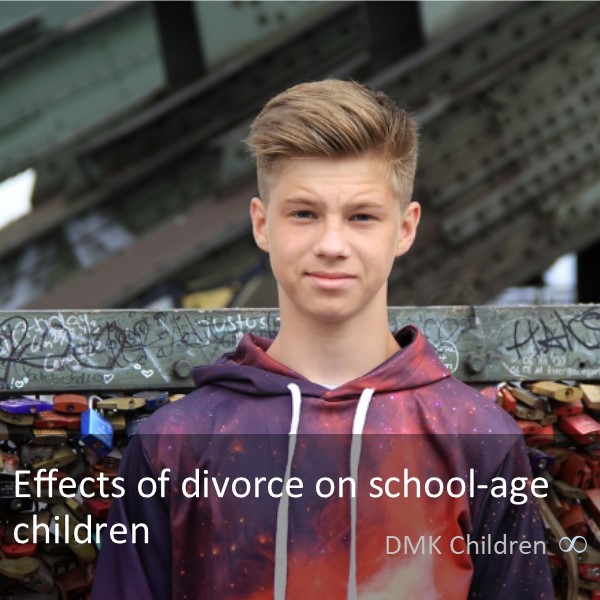Effects of divorce on children Ages 6 thru 18
6 to 11 years
These children are old enough to understand the basic complexities of a marriage that's dysfunctional. However, they have a stake in the family unit and fear the divorce will sever their attachment to each parent.
These fears of abandonment can cause these children to emotionally lash out at parents, siblings or others (friends, teachers, caregivers). They may see the divorce as an enemy and feel negativity towards anyone that may have been involved in initiating it. This negativity is usually primarily focused on one or both parents, but, it can include counselors, individuals for which either parent had a relationship or friends and family.
It's confusing for these children to have these mixed emotions of love and betrayal. Worse is when one parent blames another and voices such complaints to the child or in front of the child.
If these children are in denial of their parent's separation and divorce, they may desperately want to reassemble their family and may have false expectations that their mom or dad will someday reunite. It’s important to speak frequently and openly to your children so that they can realize the permanency of the changes, but that the goal is to provide a happier dual home environment.
If one parent is less involved following the separation, it's important to remain positive and consistent in your care for the child to minimize their feelings of abandonment. Counseling or group therapy may be helpful to help your child find the communication skills necessary to express his feelings and goals.
11 to 18 years
This age range is extremely affected by a parent's divorce. It may be the most influential time in a child’s life whereas a divorce may affect his/her behavior, future relationships, peer influences and decision making skills. Your child may blame one or both parents for the marriage demise and consequent divorce. He/she may be more likely to reach outside the home to vent about the situation. The feeling of parental betrayal may shatter your child's belief system. He/she may be more likely to either overachieve or demonstrate blatant disregard for rules, grades or parental respect. He/she may also float between really good behavior to making uncharacteristically bad choices.
Girls and divorce
Children who seem overly pleasing or positive may be hiding their true feelings of resentment, fear, anger or blame about the divorce. It’s important to continue to provide your child an opportunity to discuss her feelings about how she feels about her current daily happenings along with friends, family or the divorce. Girls are specifically prone to have a delayed reaction to the effects of the divorce.
It has been suggested that since girls tend to be closer to their mothers during and after the break-up, they conceal their own feelings out of concern for their mother's adjustment to the new single-parenting lifestyle.
Girls may need to have extra encouragement to express their emotions in a healthy and consistent way in order to avoid later problems with internalized feelings and low self-esteem. Some may have unresolved guilt over fault in the break-up or siding with one parent or the other. Girls tend to respond very well to group therapy and counseling following their parent's divorce.
Boys and divorce
Some boys have a tendency to feel extra obligatory towards household responsibilities when a father is not in the home. It can range in financial responsibilities to controlling his mother's social life. It's important for sons to feel secure following a separation and divorce. Boys should stay in touch with their father and if living with mom, they should have strict boundaries to provide them a secure, dependable environment in which young men generally thrive.
It’s very important that you limit arguing or demonstration of aggressive behaviors in front of boys. Their hormones can make their behavior erratic and difficult to control in teen years. Parental misbehavior by one or both parents can further fuel their own aggressions. Counseling following divorce may be beneficial. It's helpful that boys have a chance to be involved in selecting their counselor if therapy is considered.
Greater risks for teens following divorce
They may be more inclined to lie and tell you what you want to hear in order to avoid sharing their feelings. Substance abuse, poor relationship decisions, teen pregnancy, heightened chance for dropping out of school are all more prevalent in a single family household. Teens in single family households are at a greater risk for teen suicide. In fact, teen suicide is 4 xs the national average when teenagers live without a father in their home.
It's important to follow your instincts about your child’s behavior while also recognizing the preteen and teen years are full of turbulent times, hormones and emotions. Teen years mixed with divorce will require a great deal of patience, empathy and possible psychotherapy in order for the child to overcome the issues that affects his current and future happiness. It's also helpful if parents also seek therapy in an effort to cope with the family trauma following a separation or divorce.
Without downplaying the risks and possible outcomes of teens and preteens following a parent's divorce, it’s important to recognize that a million children are affected by their parent's divorce every year. It's very common, but it's also very personal to your child. They need you more than they may indicate.
Remaining a primary person in your child’s life greatly reduces the risks and provides your child a better chance of less negative long-term effects. Good communication skills and on-going open dialogue with genuine interest in your teen's life, feelings and problems will certainly give your child the best opportunity to heal.
Disclaimer
The information provided by respective owner's ("we", "us" or "our) on Divorce Me Knot (referenced also as "DivorceMeKnot.com", "dmk", "DMK", "OurDMK.com", "OurDMK", "application" or "site") is for general informational purposes only and is subject to change with or without notice. All information on our site and application is provided in good faith, however we make no representation, guarantee or warranty of any kind, express or implied, regarding the accuracy, validity, adequacy, reliability, availability or completeness of any information on the site or application.
The information in articles and all content on this site should not be considered psychological or behavioral health therapy, counseling or legal, financial, real estate, mortgage, insurance or professional advice. It should not be used in place of professional advice from a licensed professional or credentialed expert. Providers of content on this site, herein known as "Contributors" (inclusive of, but not limited to writers, bloggers, editors, employees, developers, graphic designers, advertisers, partners, affiliates, references, experts, professionals and site owners) are not legally liable for any misinformation, errors or omissions. Names, details and images may have been changed in the content of this site.
Under no circumstances should DMK and/or it's Contributors have any liability to users of the site for any loss or damage incurred to users as a result of the use of this site or application or reliance of any information provided on the site or application. Use of the site or application and reliance on any information from the site or application is solely at the user's own risk.
For complete site disclaimers review "Disclaimers" on this site or click the link below.
Read Complete Site Disclaimers Here




 How to resolve AdBlock issue?
How to resolve AdBlock issue?